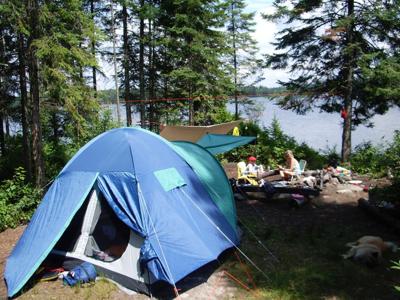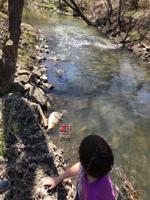Sleeping under the stars and braving the wilderness can be magical — or miserable. It all depends on how you do it.
If you plan to pack a tent and explore some of Ontario’s famous natural beauty this summer, we spoke with three seasoned campers who shared their top tips and tricks for making the most of your outdoor adventure.
Sunnybrook Park became a refuge for editor-in-chief Nicole MacIntyre’s family, rekindling their appreciation for the outdoors.
Sunnybrook Park became a refuge for editor-in-chief Nicole MacIntyre’s family, rekindling their appreciation for the outdoors.
What to know before you start
Ontario is home to more than 330 provincial parks, plus a wide range of national, municipal and private campgrounds, as well as conservation areas. Like booking a hotel, you’ll need to .
Debbie Kriz, who helps run the Facebook group says she points newer campers to the which breaks down the basics from setting up a tent to booking a campsite.
You might have a specific image in mind when you picture camping but there are several different categories that you have to know before you book.
Car camping — where you can drive right up to your site — is the most common starting point for beginners, according to Sakthi Periasellappan, who runs the website It costs about $70 a night and will often include modern luxuries, like nearby washrooms and showers.
Glamping, which swaps the tent for indoor spaces like cabins or yurts, runs around $150–$200 a night. For more experienced campers, backcountry camping requires paddling or hiking into a remote site and brings its own set of challenges.
Periasellappan began his outdoor journey in 2012 after moving to Ontario from India. He wanted to explore the country after dealing with the long and harsh winters.
He says he made many mistakes starting out but his most common was underestimating the weather.
“So I have made that old mistake over and over and over again multiple times. There was a time in Bruce Peninsula. It was pretty warm in the daytime and I packed light. The cold started ticking in, I didn’t have proper, bedding. So literally I had to get back into my car and sleep in the car and even then, it was super duper cold,” Periasellappan said.
Beyond the basics like a tent and a tarp, Periasellappan says beginners often forget other essentials like lighter fluid, fire starting kits, ropes and bear spray, adding that many beginners will opt for cheap, collapsible water bottles that ultimately fall apart in the wild.
“These are small things that most people overlook,” Periasellappan said.
Other mistakes Periasellappan sees in the community is carrying too much gear, especially when people are backcountry camping. He encourages people to do their research and see how much they can carry before hitting the wilderness with all of their stuff.
Alan McKay, who helps train scout leaders and is an admin. for the Facebook group , tells rookies to just be prepared.
“It’s not hard to plan,” McKay said. “There’s lots of advice out there.”
Though the “golden rule” for McKay is to try your equipment at home, he made a mistake last month when he didn’t test a brand-new inflatable sleeping mat that turned out to be leaky.
I was 21 the first time I went camping — and honestly, I hadn’t planned on it.
I was 21 the first time I went camping — and honestly, I hadn’t planned on it.
Tips for more experienced campers
Can you ever really master the outdoors?
McKay described an “epiphany moment” for another scout leader when he told them to bring a blue shop towel instead of a paper towel.
“She looked and she said, ‘oh my god. That’s brilliant, I’m never taking paper towel again.’ Because a shop towel is hardy, you can use it twenty times before it’s trashed.” McKay said. “When you’re done with it, you throw it in the fire and burn it.”
McKay added that you should wipe your plate clean with leaves off the ground, as long as you make sure to burn them after so you don’t attract any wild animals.
Periasellappan says the newest addition to his trips is a mosquito net cap that shields his upper body from bugs so he can keep his hands free while working. He also carries a screen canopy tent which can go around a bench and create a makeshift, bug-free living room around a campsite.
Even just two hours a week in nature has been linked to better mood, focus, and mental health.
Even just two hours a week in nature has been linked to better mood, focus, and mental health.
“Especially when I’m camping with family, that is super helpful. We pull down the nets, we close it off, it’s still breathable. Fresh air comes in and goes out and you have the bench in the middle to play board games,” Periasellappan said.
Periasellappan also says many experts aren’t aware of how many camping groups there are for anybody that wants company on their trips.
Kitz likes to bring along her “very tiny” hammock and an espresso machine on her trips.
“I mean, you don’t have to suffer if you’re camping. You could do it in a way that’s very comfortable,” Kitz said.
Everybody should have a chance to explore the great outdoors that Ontario offers, which is why the ɫɫ�� Star Fresh Air Fund needs your help. Please consider donating if you’re able so every kid can experience the joys of nature.
If you’re able, please consider donating to help more children experience the joy, freedom, and confidence that come from a summer spent outside.
The ɫɫ�� Star Fresh Air Fund
How to donate:
Online:
To donate by Visa, Mastercard or Amex using our secure form.
By cheque:
Mail to the ɫɫ�� Star Fresh Air Fund, 8 Spadina Ave., ɫɫ��, ON M5V 0S8
By phone: Call 647-250-8282
Tax receipts will be issued.
FOLLOW US ON SOCIAL:
Instagram: @torontostarchildrenscharities
Facebook: @thetorontostarchildrenscharities
X: @TStarCharities
LinkedIn: the ɫɫ�� Star Children’s Charities
TikTok: @torstarchildrenscharity
#StarFreshAirFund
























